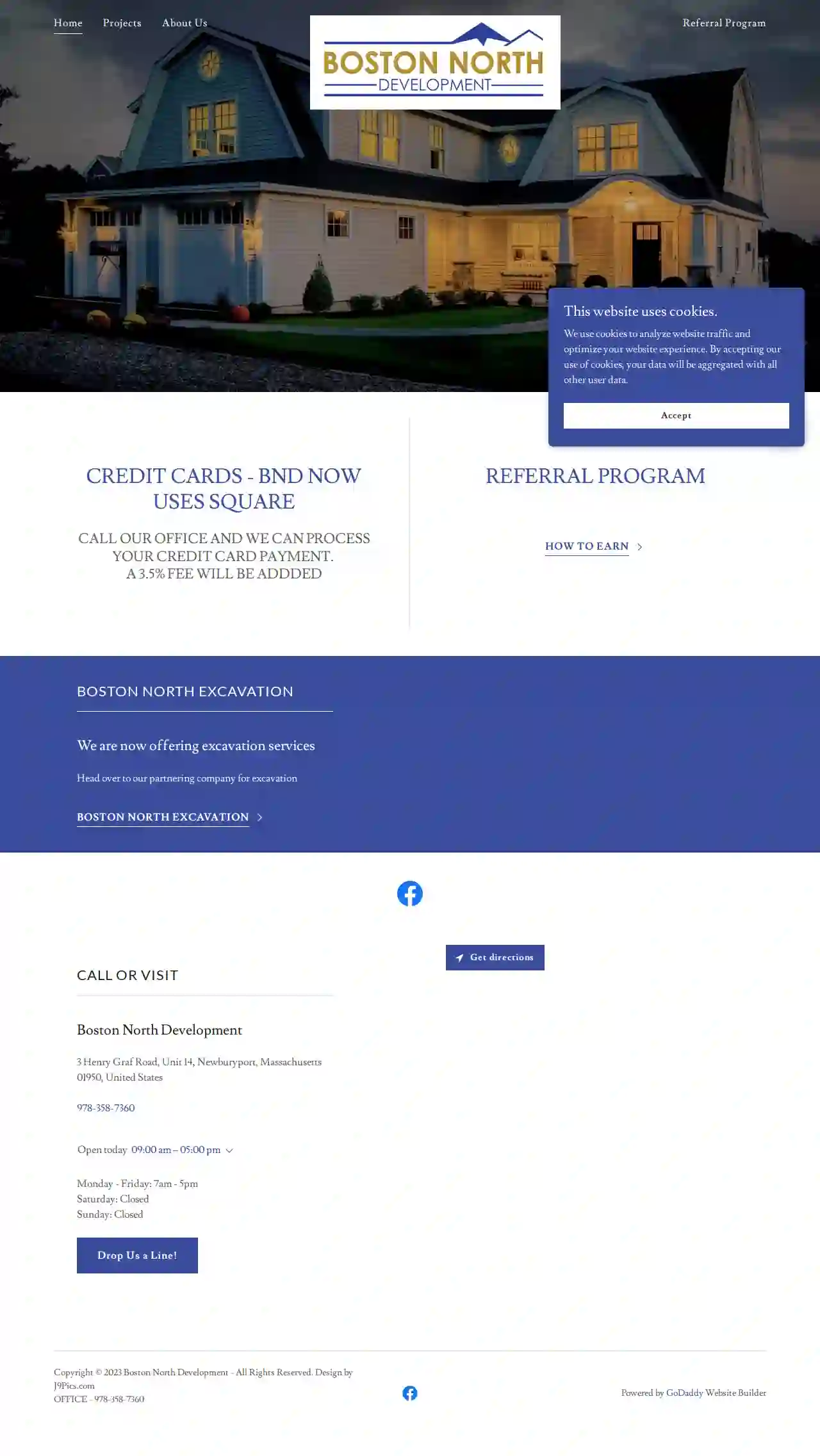Dirt Contractors Boston
Find top Dirt Contractor in Boston
Get up to 3 Dirt Hauling quotes for your project today! Compare profiles, reviews, accreditations, portfolio, etc... and choose the best service.
- No
North American Excavating
32 reviewsBoston, US- Services
- Why Us?
- Gallery
Get Quote 
DIG
4.5390 reviewsBoston, US- Services
- Why Us?
Get Quote
Environic Solutions Inc.
4.267 reviewsBoston, US- Services
- Why Us?
Get Quote
Boston Paving Solutions
4.819 reviewsBoston, US- Services
- Why Us?
Get Quote
DIG
4.4492 reviewsBoston, USDinner Deserves Dinner Every night should end with the fall dinner you deserve. Real, scratch-cooked fall food that are nourishing, seasonal, and perfect for your coziest night in. Dinner & Dessert for under $17. Tired of those flimsy paper bags? Us too. Our meals now come in snazzy, reusable tote bags. Perfect for groceries, beach days, or just looking cool while saving the planet. Because who said sustainability can't be stylish? We believe dinner should make you happy, and you deserve better than sad dinner. Let us cook it for you. If it came out of a blender or if you poured cold milk over it, it’s not dinner in our book. We believe a mid-week dinner doesn't have to be something you settle for or make do with. It should be a mini-celebration that brings you joy and comfort. Every night should end with the fall dinner you deserve. Your neighborhood. Your kitchen. Every DIG is a part of its neighborhood. Each location is led by a local chef, serving fresh seasonal ingredients. At DIG, we believe nothing should get in the way of a healthy, balanced, satisfying meal.
- Services
- Why Us?
- Gallery
Get Quote
Boston North Development
3.73 reviewsBoston, US- Services
- Why Us?
Get Quote
Doherty Excavating Inc
1Boston, US- Services
- Why Us?
Get Quote
Boston Foundation Repair
55 reviewsBoston, US- Services
- Why Us?
Get Quote
Over 3,943+ Excavation Businesses onboarded
Our excavation pros operate in Boston and surrounding areas!
ExcavationHQ has curated and vetted Top Excavation Contractors arround Boston. Find a trustworthy business today.
Frequently Asked Questions About Dirt Contractors
- For Structural Fill: Use compacted granular fill, such as gravel or crushed stone, for stability and drainage. Avoid using organic materials like topsoil or wood chips, as they decompose and can create voids over time.
- For Landscaping: If you plan to plant in the filled area, use a blend of topsoil and fill dirt. This provides a balance of fertility and structure. Amend the soil with compost or other organic matter to enhance its drainage and nutrient content.
- For Drainage: If the hole is intended for drainage, use a layer of gravel or crushed stone at the bottom to improve water flow. Then, backfill with a porous soil mix that allows water to percolate through.
- Clearly Define Your Project Scope: Provide the contractor with detailed information about your project, including the size of the area, the type and volume of dirt needed, the desired grading or leveling, and any specific requirements.
- Obtain Multiple Quotes: Request quotes from multiple reputable dirt contractors to compare prices, services, and experience. Ensure the quotes are comprehensive and include all project details.
- Verify Licensing and Insurance: Confirm that the contractor has the necessary licenses, insurance coverage, and a good safety record. This protects you from potential liabilities.
- Communicate Openly and Regularly: Maintain open communication with the contractor throughout the project, addressing any questions, concerns, or changes promptly. Regular updates and site visits can help ensure everything is on track.
- Document Everything: Keep written records of all communication, contracts, quotes, and invoices for reference and accountability.
- Increases Soil Stability: Compacted soil is less likely to shift, settle, or erode, providing a stable foundation for structures, walkways, or driveways.
- Improves Drainage: Compaction can enhance drainage by reducing the soil's porosity and allowing water to flow more efficiently.
- Reduces Settlement: Proper compaction minimizes future settling, preventing uneven surfaces or structural damage.
- Enhances Load-Bearing Capacity: Compacted soil can support heavier loads without excessive compression or deformation.
- Plant Selection: Understanding your soil's pH and nutrient levels helps you choose plants that will thrive in those conditions.
- Fertilizer Recommendations: Soil tests reveal nutrient deficiencies, allowing you to apply appropriate fertilizers to meet plant needs.
- Soil Amendments: Identify soil imbalances, such as compaction or high clay content, and recommend amendments to improve soil structure and drainage.
- Construction Projects: Assess soil bearing capacity and other properties to ensure the stability and safety of foundations and other structures.
- Environmental Assessments: Detect potential soil contamination and determine the need for remediation.
What type of dirt is best for filling a hole?
What are some tips for working with dirt contractors?
What is dirt compaction, and why is it important?
What is a soil test, and why is it important?
What type of dirt is best for filling a hole?
- For Structural Fill: Use compacted granular fill, such as gravel or crushed stone, for stability and drainage. Avoid using organic materials like topsoil or wood chips, as they decompose and can create voids over time.
- For Landscaping: If you plan to plant in the filled area, use a blend of topsoil and fill dirt. This provides a balance of fertility and structure. Amend the soil with compost or other organic matter to enhance its drainage and nutrient content.
- For Drainage: If the hole is intended for drainage, use a layer of gravel or crushed stone at the bottom to improve water flow. Then, backfill with a porous soil mix that allows water to percolate through.
What are some tips for working with dirt contractors?
- Clearly Define Your Project Scope: Provide the contractor with detailed information about your project, including the size of the area, the type and volume of dirt needed, the desired grading or leveling, and any specific requirements.
- Obtain Multiple Quotes: Request quotes from multiple reputable dirt contractors to compare prices, services, and experience. Ensure the quotes are comprehensive and include all project details.
- Verify Licensing and Insurance: Confirm that the contractor has the necessary licenses, insurance coverage, and a good safety record. This protects you from potential liabilities.
- Communicate Openly and Regularly: Maintain open communication with the contractor throughout the project, addressing any questions, concerns, or changes promptly. Regular updates and site visits can help ensure everything is on track.
- Document Everything: Keep written records of all communication, contracts, quotes, and invoices for reference and accountability.
What is dirt compaction, and why is it important?
- Increases Soil Stability: Compacted soil is less likely to shift, settle, or erode, providing a stable foundation for structures, walkways, or driveways.
- Improves Drainage: Compaction can enhance drainage by reducing the soil's porosity and allowing water to flow more efficiently.
- Reduces Settlement: Proper compaction minimizes future settling, preventing uneven surfaces or structural damage.
- Enhances Load-Bearing Capacity: Compacted soil can support heavier loads without excessive compression or deformation.
What is a soil test, and why is it important?
- Plant Selection: Understanding your soil's pH and nutrient levels helps you choose plants that will thrive in those conditions.
- Fertilizer Recommendations: Soil tests reveal nutrient deficiencies, allowing you to apply appropriate fertilizers to meet plant needs.
- Soil Amendments: Identify soil imbalances, such as compaction or high clay content, and recommend amendments to improve soil structure and drainage.
- Construction Projects: Assess soil bearing capacity and other properties to ensure the stability and safety of foundations and other structures.
- Environmental Assessments: Detect potential soil contamination and determine the need for remediation.